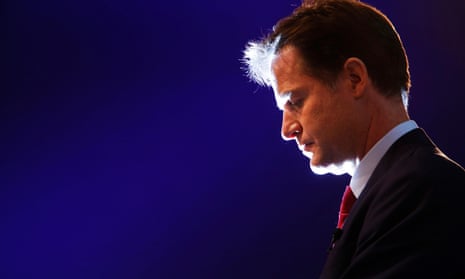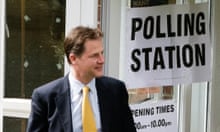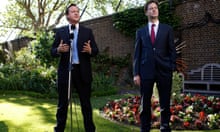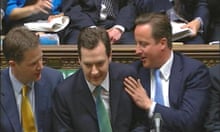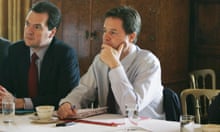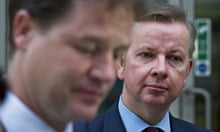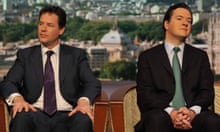Nick Clegg discussed resigning as Liberal Democrat leader in the wake of the party’s humiliating reverses in the European and local elections in May 2014, an investigation by the Guardian has revealed.
In a sign of the immense toll taken by four years in coalition, the former deputy prime minister experienced what his mentor and former Lib Dem leader Lord Ashdown described as the “darkest of the dark nights of the soul”. Clegg consulted several senior colleagues about whether he had become a barrier to the party’s message being heard and whether he should go.
Clegg made numerous phone calls to discuss his position a year before the general election in which his party was reduced from 56 seats to eight. He told one colleague: “If I believe – and I am very close to thinking it – I am the problem and not the solution, I have to stand to one side.”
One senior Lib Dem who spoke to Clegg at the time said: “I told him, ‘You don’t have that luxury – this is your burden now, you have to carry it through to the election. Whether you believe that or not, it’s tough-titty. You can’t now put this down until the election. You can do it after the election if you want, but you can’t do it now.’”
Clegg was talked out of quitting by Ashdown, as well as by his most likely successor, Tim Farron, and most of his closest advisers. They told him to stay in post and fight to defend the cause of liberalism at the general election. Clegg finally resigned the day after the general election, on 8 May.
Farron recalled the aftermath of the 2014 setbacks. “I just thought this could end up in a bloodbath, and we’re far better off sticking with the captain who has done nothing to deserve this,” he said.
Two days after the 2014 elections, Farron spoke to Clegg. “Nick was just distraught about everything and we knew the Euros were going to come the day after,” he said. “He felt personally every single loss. said Farron.
Ashdown said Clegg soon recovered. “It was astonishing the speed from which he moved from the darkest of the dark nights of the soul to utterly on form, utterly clear about what he was doing.” Clegg is expected to give his first interview since the election on LBC on Thursday morning.
At the 2014 European elections, Lib Dems were reduced to just one MEP. A defeated Clegg appeared, red-eyed and exhausted, in a BBC interview to admit that the results were “gutting” and “frankly heart-breaking”, but he insisted that the thought of resignation “has never crossed my mind”.
Although he was talked into carrying on, there were anxieties about Clegg’s leadership and he faced a party coup designed to put Vince Cable, the then business secretary, in charge.
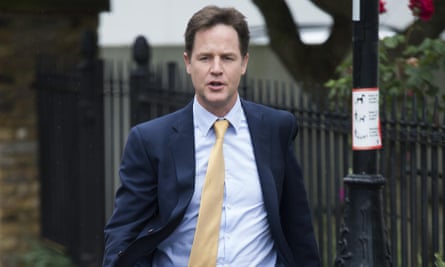
The revelation of Clegg’s near resignation and subsequent attempt to force him out comes as part of a Guardian investigation into the collapse of the party that was in government until just over a month ago. The Guardian report also reveals:
- The extent to which Cable was fully aware aware of the plot to oust Clegg in the wake of the 2014 elections.
- The party’s director of communications, Steve Lotinga, bluffed Cable on a ministerial visit in China into confirming that his friend Lord Oakeshott was behind polls showing that the party was heading for defeat in 2015.
- The former cabinet minister Ed Davey felt that Clegg showed strong leadership in difficult circumstances, but that the party’s manifesto was “blancmange”.
- The leadership was rocked by the leaking by an aide to the former Scotland secretary Alistair Carmichael of a private civil service note which claimed that Nicola Sturgeon favoured David Cameron over Ed Miliband. Lotinga described it as “the worst leak in history”.
As the coup plot developed, Clegg’s team smoked out Cable, who was in China. Lotinga told him: “Either you distance yourself from this, or you and Oakeshott are going to be named in tomorrow’s papers as the people behind it.” Cable duly released a statement distancing himself from Oakeshott, even though the former business secretary knew about the polls and his aides had discussed their release with the peer. John Pugh, the Liberal Democrat MP for Southport, confirmed that he also spoke to Cable to ensure that he would be willing to take over if Clegg was toppled.
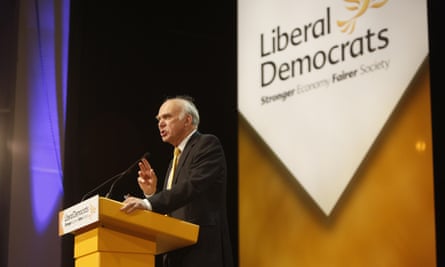
The investigation into the causes of the party’s electoral collapse reveals that senior figures were hoping to win 23 to 30 seats right up until polling day. They now claim the defeat was largely due to voters backing the Conservatives for fear of Labour being under the control of the Scottish National party.
Ashdown claims the mixture of inaccurate opinion polls and fear of Ed Miliband made it difficult for the party to retain its vote, while senior party officials admit that their attempt to counter the Conservative use of the threat an SNP-Labour coalition government never worked.
The Lib Dems tried to counter with Bluekip, the threat of a Tory, Ukip and Democratic Unionist alliance, but even those asked to communicate the message admitted it was not credible and was gaining no media traction.
Davey told the Guardian: “We were the centre party and, on one level, that sounds really attractive. But the old adage of if you’re in the middle of the road you might get run over operated in spades. We were in the middle of the road without any distinction, so we had no visibility jacket on, no one could see us, so we really did get run over.”
